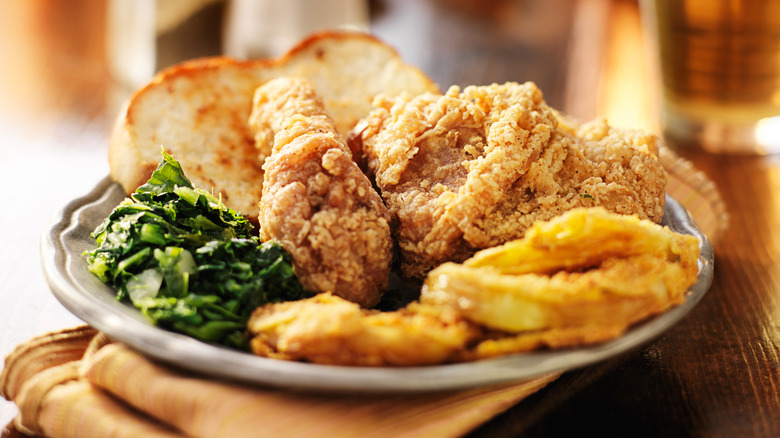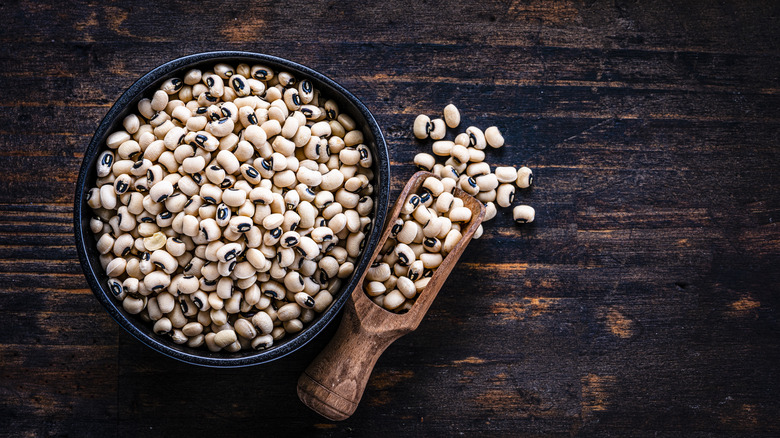Black History Month: What Really Defines Soul Food?
Black History Month is an annual celebration and recognition of African American history and culture, and one of the prominent staples of African American culture is its cuisine — specifically, soul food. If you have the pleasure of enjoying a plate of soul food, some of the foods you're likely to find before you are fried chicken, cornbread, candied yams, and macaroni & cheese. Soul food originated from the culinary innovation and resourcefulness of enslaved Africans in America who received scant food rations for sustenance. Over time, using the limited ingredients available to them, they recreated recipes they remembered making in their native lands using newly learned European and Native American culinary influences. The result of this culinary blending was soul food. However, the term "soul food" didn't come until much later.
During the 1940s and 1950s in the United States, Black jazz musicians consistently lost lucrative jobs to white jazz musicians, which was profoundly frustrating considering that African Americans gave birth to jazz music. In an effort to infuse their music with a sound that white musicians couldn't recreate, Black jazz musicians began incorporating gospel in their music, a pervasive sound in the Black church in the American South. Black musicians began calling this musical infusion "soul," and soon, the term became a descriptor for various elements of Black culture (soul music, soul brother). This included African American cuisine. This delicious element of African American culture and heritage can be enjoyed in America's best soul food restaurants.
There are three types of soul food
One type of soul food is called down-home healthy. Adrian E. Miller, author of "Soul Food: The Surprising Story of an American Cuisine, One Plate at a Time," explained to Epicurious, "The idea there is that you take traditional soul food preparations and you try to lighten them up on the calories, the salt, the fat." For example, instead of using smoked or salted pork, you would use smoked turkey. You might grill or bake instead of the traditional fry."
A second type of soul food is upscale soul food, which uses fancier ingredients such as heritage meats and purebred breeds of pork, turkey, beef, and lamb. These animals have free rein in their environment and only eat a natural diet. Heritage meats have more flavor and nutrition, and they're more expensive.
The third type of soul food is vegan soul food. While this may be surprising, the food enslaved Africans ate in America was mostly plant-based, with only a little meat. Registered dietitian Jessica Jones of wellness brand Food Heaven Made Easy told Bon Appetit Management Company, "Enslaved African people brought several seeds from their homeland for planting, all present in African American soul food today. Think okra, black-eyed peas, and watermelon. Soul food includes plant-based staples such as kale, collards, mustard greens, and sweet potatoes."
There is a difference between Southern food and soul food
Southern and soul food are sometimes lumped together because of their ties to the U.S. South and their typical ingredients, but they're different. Perhaps the simplest way to distinguish soul food from Southern food is that the way soul food is cooked, eaten, and enjoyed is rooted in a specifically African American cultural tradition that has been passed down from generation to generation. There are also technical differences between the cooking methods of soul and Southern food.
If you eat soul food after eating Southern food, you'll likely notice that soul food has more robust flavor profiles. Adrian E. Miller explained to The Virginian-Pilot, "Soul food tends to be more highly seasoned."
The soul food historian also highlighted how some soul food dishes and Southern food dishes have similar ingredients that are cooked differently. Miller said, "It would not be usual to go to a Black restaurant and have gumbo with bone-in chicken, whereas in a Southern restaurant, the chicken would be cut up and the bones removed."
Another example Miller offered was how a particular side dish found in soul food and Southern food is prepared differently. "Almost every soul food recipe that I've seen for cornbread has some amount of sugar. White Southern cooks would call this cake," he said.
Ultimately, what defines soul food is its origins, history, types, recipes, and intrinsic connection to African American culture. While both are delicious, they do have their differences.


